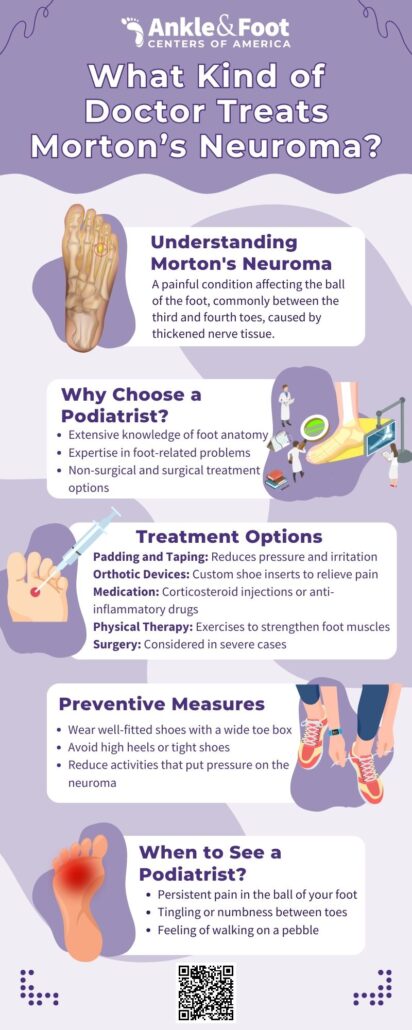Table of Contents
Introduction
Morton’s Neuroma is a foot condition that can cause significant discomfort and interfere with a person’s daily activities. It is a common question among those suffering from this condition: “What kind of doctor treats Morton’s Neuroma?” This article aims to provide a comprehensive answer to this question and guide patients towards the right path for treatment.
Understanding Morton’s Neuroma: What is Morton’s Neuroma?
Morton’s Neuroma is a painful condition that affects the ball of your foot, most commonly the area between your third and fourth toes. It involves a thickening of the tissue around one of the nerves leading to your toes. This can cause a sharp, burning pain in the ball of your foot. Your toes may also sting, burn, or feel numb.
Causes and Symptoms of Morton’s Neuroma 
High-heeled shoes have been linked to the development of Morton’s Neuroma. More specifically, shoes that are tight, narrow, or have a pointed toe box can compress the nerves in your feet, leading to inflammation and thickening. Certain sports activities, such as running or sports that require tight shoes, can also put extra pressure on your feet, potentially causing Morton’s Neuroma.
Symptoms of Morton’s Neuroma often start gradually and may come and go initially. They typically manifest as a tingling sensation in the space between the third and fourth toes, which can worsen over time. As the condition progresses, the pain may become sharp or burning, especially when walking. Some people describe the pain as feeling like they are standing on a pebble in their shoe or on a fold in their sock.
The Role of a Podiatrist in Treating Morton’s Neuroma
When it comes to the question, “What kind of doctor treats Morton’s Neuroma?”, the answer often begins with a podiatrist. Podiatrists are medical professionals who specialize in diagnosing and treating conditions of the foot, ankle, and related structures of the leg. Their extensive knowledge and expertise make them particularly well-suited to address issues like Morton’s Neuroma.

Diagnosis by a Podiatrist
The first step in treating Morton’s Neuroma is a proper diagnosis, and this is where a podiatrist’s expertise comes into play. They will begin by reviewing the patient’s medical history and conducting a thorough physical examination of the foot. The podiatrist may manipulate the foot to reproduce symptoms and may also suggest imaging tests such as X-rays, ultrasound, or MRI to confirm the diagnosis and rule out other conditions.
Non-Surgical Treatment Options
Podiatrists are well-versed in a wide range of non-surgical treatments for Morton’s Neuroma. These treatments aim to relieve pressure on the neuroma and reduce inflammation. They include:
- Footwear modifications: Wearing shoes with a wide toe box and avoiding high heels or tight shoes can help relieve pressure on the neuroma.
- Orthotic devices: Custom shoe inserts or pads can help reduce pressure on the nerve.
- Injections: Corticosteroid or sclerosing alcohol injections can help reduce pain and inflammation.
- Physical therapy: Certain exercises and therapies can help strengthen the foot and ankle, improve mobility, and relieve symptoms.
Surgical Treatment Options

If non-surgical treatments fail to provide sufficient relief, surgical intervention may be considered. There are two main types of surgery for Morton’s Neuroma:
- Decompression surgery: This procedure involves cutting nearby structures, such as the ligament that binds together some of the bones in the front of the foot, to relieve pressure on the nerve.
- Neurectomy: In severe cases, it may be necessary to remove the affected nerve. However, this procedure can result in permanent numbness in the affected toes.
The Role of an Orthopedic Surgeon in Treating Morton’s Neuroma
Orthopedic surgeons are also integral to the treatment of Morton’s Neuroma. These medical professionals specialize in the musculoskeletal system, which includes bones, joints, ligaments, tendons, and nerves. While they are equipped to handle a wide range of conditions, including Morton’s Neuroma, they often collaborate with podiatrists for the best patient outcomes.
When is an Orthopedic Surgeon Involved?
Orthopedic surgeons become involved in the treatment of Morton’s Neuroma when non-surgical treatments have not provided sufficient relief, or when the condition is severe. They are trained to perform the surgical procedures necessary to alleviate the symptoms of Morton’s Neuroma, such as decompression surgery or neurectomy.
However, it’s important to note that orthopedic surgeons often refer their Morton’s Neuroma patients to a foot and ankle specialist, like a podiatrist. This is because podiatrists have specialized knowledge and training in treating conditions of the foot and ankle, making them particularly well-suited to handle Morton’s Neuroma.
Collaboration Between Orthopedic Surgeons and Podiatrists
The collaboration between orthopedic surgeons and podiatrists is key to providing the best care for patients with Morton’s Neuroma. While orthopedic surgeons have a broad understanding of the musculoskeletal system, podiatrists offer a more specialized focus on the foot and ankle. This combination of broad and specialized knowledge ensures that patients receive comprehensive care.
It’s important to note that while surgery can provide relief, it also comes with risks. Therefore, it’s typically considered only after non-surgical treatments have been exhausted.
Choosing the Right Doctor for Morton’s Neuroma
When faced with the question, “What kind of doctor treats Morton’s Neuroma?”, patients may feel overwhelmed by the options. However, understanding the roles of different medical professionals can help guide this important decision.
Factors to Consider When Choosing a Doctor
When choosing a doctor to treat Morton’s Neuroma, patients should consider several factors:

- Specialization: Doctors who specialize in foot and ankle conditions, such as podiatrists, often have the most experience and knowledge in treating Morton’s Neuroma.
- Experience: Doctors with extensive experience in treating Morton’s Neuroma are likely to be up-to-date on the latest treatments and techniques.
- Treatment approach: Some doctors may prefer conservative treatments, while others may be quicker to suggest surgery. It’s important to find a doctor whose approach aligns with the patient’s preferences and needs.
- Communication: A good doctor-patient relationship is built on clear communication. The doctor should be able to explain the diagnosis, treatment options, and potential outcomes in a way that the patient understands.
The Importance of Specialized Care
While many types of doctors can diagnose and treat Morton’s Neuroma, podiatrists and orthopedic surgeons often provide the most specialized care. These professionals have dedicated their careers to understanding and treating conditions of the foot and ankle. Their specialized knowledge and experience make them particularly well-equipped to handle complex cases of Morton’s Neuroma.
Our Approach to Treating Morton’s Neuroma
As a nationally recognized podiatrist specializing in treating Morton’s Neuroma, Dr. Peter Smith has a unique approach to managing this condition. His philosophy is rooted in providing personalized care, using evidence-based treatments, and focusing on patient education.
Personalized Care
He understands that each patient is unique, and so is their experience with Morton’s Neuroma. Therefore, he takes the time to understand each patient’s symptoms, lifestyle, and treatment goals. This personalized approach ensures that each treatment plan is tailored to the individual patient’s needs and circumstances.
Evidence-Based Treatments
Dr. Smith is committed to using treatments that are backed by scientific research. He stays up-to-date with the latest developments in the field of podiatry and incorporates new treatments and techniques into his practice as appropriate. Whether it’s a non-surgical treatment like orthotic devices or a surgical procedure like decompression surgery, patients can trust that they are receiving care that is based on the latest medical evidence.
Patient Education
He believes that informed patients make the best decisions about their health. Therefore, he prioritizes patient education. He takes the time to explain the diagnosis, treatment options, and potential outcomes in a way that patients can understand. He also encourages patients to ask questions and actively participate in their care.
Success Stories and Case Studies
Over the years, Dr. Smith has helped many patients with Morton’s Neuroma regain their quality of life. From conservative treatments that helped patients avoid surgery to successful surgical interventions that provided lasting relief, these success stories and case studies illustrate the effectiveness of Dr. Smith’s approach.
Conclusion
Morton’s Neuroma is a condition that can significantly impact a person’s quality of life. However, with the right medical guidance and treatment, patients can manage their symptoms and regain their mobility. The key lies in understanding the question, “What kind of doctor treats Morton’s Neuroma?” and seeking help from the right medical professionals.
Recap of the Importance of Seeking Treatment
Ignoring the symptoms of Morton’s Neuroma can lead to worsening pain and potentially permanent damage. Therefore, it’s crucial to seek medical help as soon as symptoms arise. Podiatrists and orthopedic surgeons, with their specialized knowledge and experience, are often the best equipped to diagnose and treat this condition.
Make an Appointment Today
If you’re experiencing symptoms of Morton’s Neuroma, don’t hesitate to seek help. Reach out to a podiatrist near you, who can guide you towards the right treatment path. Remember, the sooner you seek help, the better your chances of managing your symptoms and preventing further complications.







